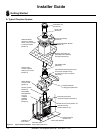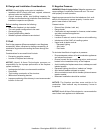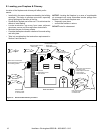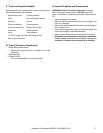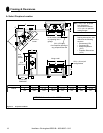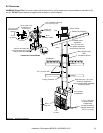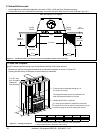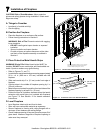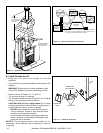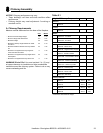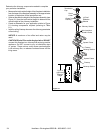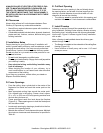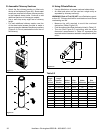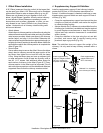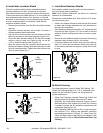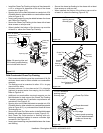
22
Outlet placed
higher than 3 ft
below the
termination cap
Attic space
Garage or
combustible
liquids storage
Outlet blocked by
snow, leaves, etc.
Clear area
outside
house or in
ventilated
crawl space
YES
NO
NO
NO
NO
Factory-built
fireplace
Use only duct materials specified by manufacturer (preferably
with short run or mainly straight duct, except small dip for cold
air trap which will help prevent flow of cold air).
Figure 7.4 Outside Combustion Air Placement
Outside Air
Hood
2 Wire Ties
Flexible Duct
(not supplied)
Figure 7.5 Outside Air Installation
E. Install Outside Air Kit
• Keep duct runs short and straight to minimize
restriction.
• The outside air kits must be installed on both sides of the
replace.
WARNING! Outside air kits must be installed on both
sides of the replace to prevent overheating and re.
• Install as shown in Figures 7.3, 7.4 and 7.5.
• The air ducts may be run vertically.
• The outside air hoods must be at least 3 ft (.91 m) below
the top of the uppermost chimney section.
NOTICE: The fireplace provides some outside air for
combustion. Other methods may be necessary if more air
is required.
CAUTION! Risk of Fire or Asphyxiation! Do not draw
outside combustion air from wall, oor or ceiling cavity, or
enclosed spaces such as an attic or garage.
• DO NOT place outside air hoods close to exhaust
vents or chimneys. Fumes or odor could be drawn
into the room through the replace.
• Locate outside air hoods to prevent blockage from
leaves, snow/ice, or other debris. Blockages could
cause the unit to overheat.
Heatilator • Birmingham BIR50-B • 4059-682C • 8/12
3 ft min. from
top of uppermost
chimney section
to air inlet.
Outside air installed
on both sides (right
side not shown)
Figure 7.3 Outside Air Inlet Locations



